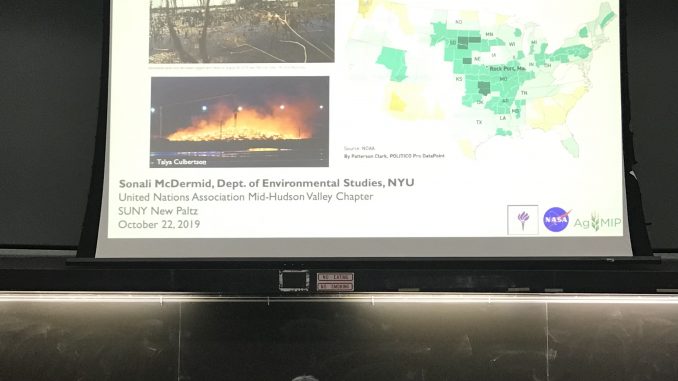
In Lecture Center 102 on a rainy Tuesday night, riveted students and faculty turned their attention to world-renowned researcher Sonali McDermid, and her knowledge of food security and global climate change.
The Political Science Department and Geo Chemical Science Department hosted the event “Our Planet, Our Future,” sponsored by the United Nations Mid-Hudson Organization (UNA).
McDermid is a researcher who focuses directly on food security with contributions to scientific discoveries within climate change. Not only has she worked with NASA, but she also reports on the Intergovernmental Panel on Climate Change (IPCC) and has recently bought a farm in the Hudson Valley, making her a perfectly qualified candidate to host this talk.
Most members of the audience were older farmers or professors with a vested interest in food security and agriculture, but there were plenty of students as well. McDermid started her lecture with a clear cut definition of food security and the four questions she planned on covering during the course of the next hour. The questions included what is food security, and whose food security are we focused on; what are the impacts of climate change on food production and security; how has agriculture driven global environmental change; and how do we produce enough nutritious food for 9-10 billion people that is also ecologically responsible?
“We aren’t talking about food production in a future climate, we’re talking about food production in a climate that has already changed,” McDermid said.
While McDermid mainly focused on the changes that have to be made within the realm of agriculture, she also touched upon smaller tweaks that could be made within our own lives at home. Limited consumption of red meat and sugar were two of her suggestions, as well as an increase in local consumption of fruits, vegetables and legumes.
One staggering statistic that McDermid talked about throughout her lecture was that 51-77% of most agricultural products are made at small to medium farms. Large land is not needed for the majority of crops that hold nutrients, and she mentioned that a call to action was needed to re-invent how food is agriculturally produced.
“In order to have resilient systems, farmers need options,” McDermid said. “They need to be able to make decisions quickly on their own terms.”
Agriculture is among the biggest drivers of our exceeded planetary boundaries (the amount of food, water and energy it takes for us to survive on the planet). It could be causal to a lack of biodiversity in recent years as well as a loss of soil as a nutrient source.
“We are engaging on the local level and thinking globally,” said Associate Professor of Political Science and International Relations Ş. İlgü Özler. “[The] Hudson Valley thrives on agriculture and therefore we have to think about the future of our communities given
climate pressures.” She also mentioned that New Paltz has recently pledged to make sustainable development goals a part of our campus strategic plan.These goals produced by the United Nations include 17 points that need to be brought up to keep our planet, and the organisms inhabiting it, sustained. These include Zero Hunger, Clean Water and Sanitation, and Climate Action. In order to save our planet, these goals should be achieved by 2030.
“I hope that she has inspired New Paltz students to become more proactive in thinking about climate change and food consumption as well as food production in our community,” Özler said.




















































































































































































































































































































































































































































































































